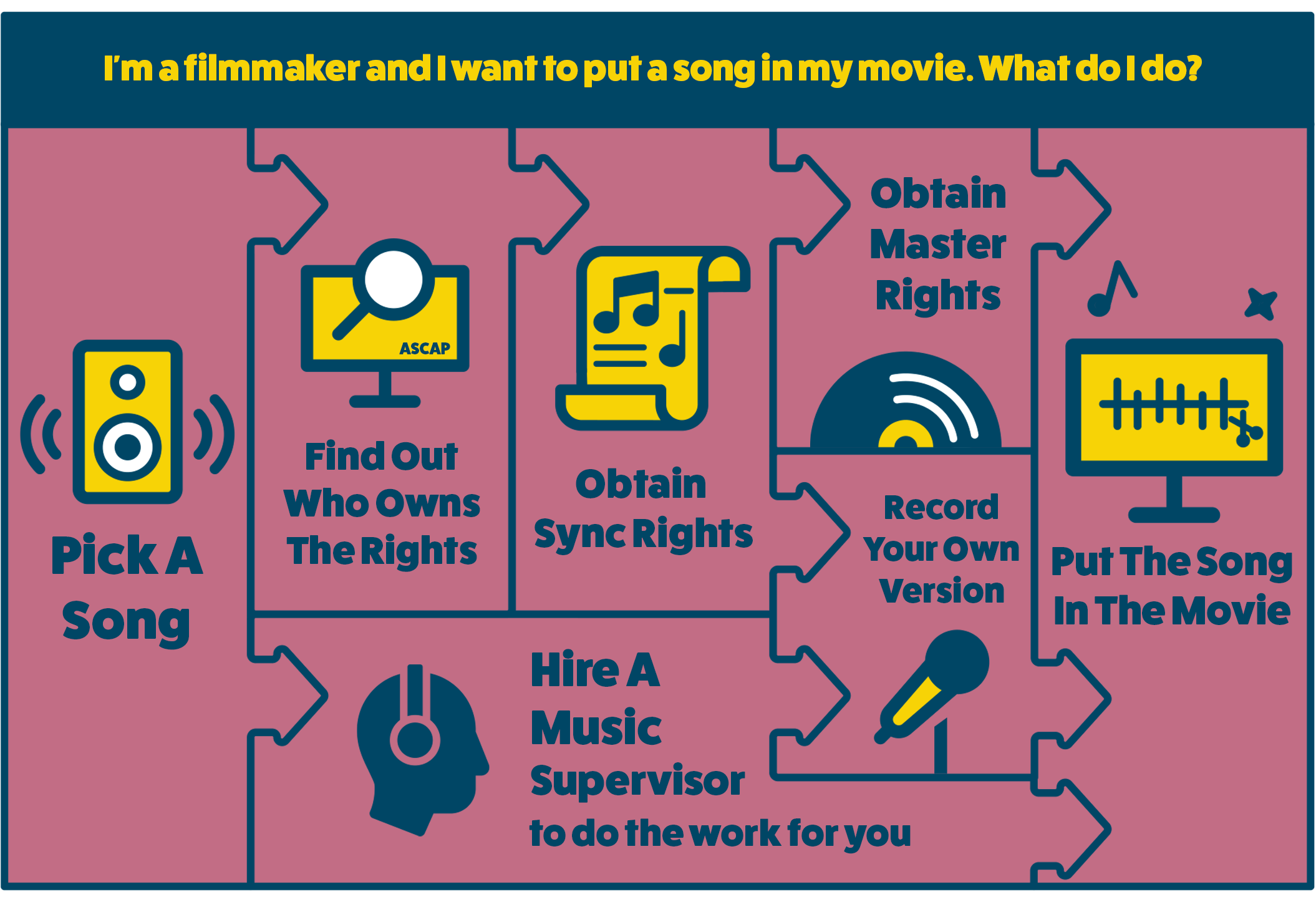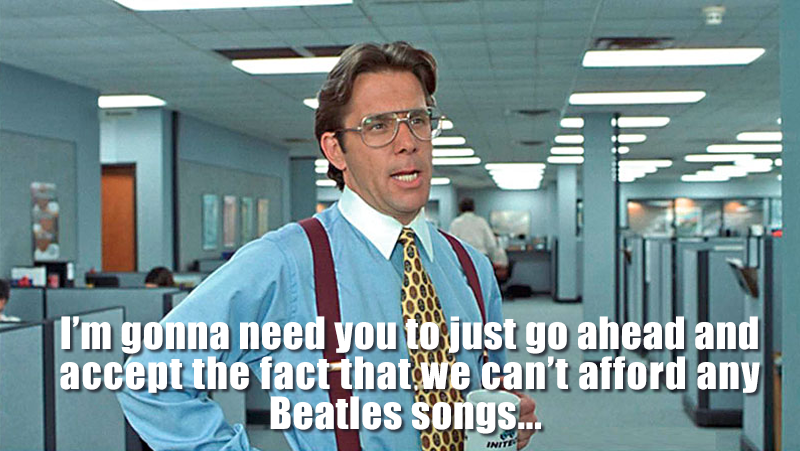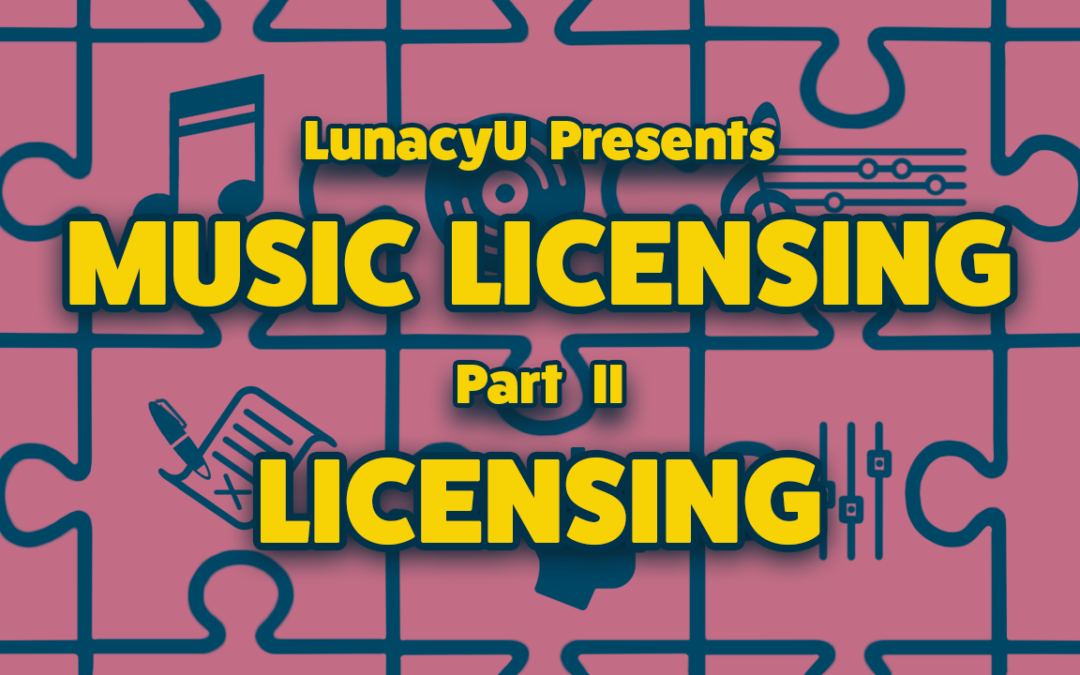Every filmmaker, from Wes Anderson to Paul Thomas Anderson, knows that finding the right music to accompany your visuals can make or break a scene — or the whole movie. But whether you’re repurposing an iconic chart topper or dusting off a hidden gem, choosing the music is only half the battle. The fun half. The hard part is getting permission to use it.
That’s why, as a supplement to our popular film music master class, Lunacy has created this practical guide to music licensing, a multi-part series that covers everything you need to know. In our first installment we covered some basic lingo, tips on choosing your music, and an overview of various music licenses. In this section we’ll be looking at how to track down music rights holders, how to approach them, and whether you might be better off hiring a music supervisor to do the leg work for you.
Start Your Search
Once you’ve chosen your music you’ll need to acquire different licenses. There are three main Performing Rights Organizations (PRO) that register music rights: ASCAP, BMI, and SESAC. It’s here you’ll learn who owns the rights to your prospective music selections. You can pick up some other valuable information from these sites as well, like who’s previously purchased the license (certain artists or record labels might be more willing to license the rights to a specific genre or style of movie).
When you’ve figured out who owns the rights you must apply for the licenses. We talked about the two most important licenses, sync rights and master rights, in Part I. Master and sync licenses are sometimes referred to as sides (as in two sides of a vinyl record). Sometimes both sides can be licensed as a package, what’s known as an All-In License.
When applying for music rights you should include a synopsis and budget of the film. It is also important to incorporate as much information as possible regarding the specific use of the song, including when and where it is being used, how many times, and the duration. It’s also relevant to mention where the film will be seen and what purpose it serves. Is it educational? Industrial? Commercial? Does it benefit a charity or cause? Is it an independent film? A short? Will it play at festivals? All of these details might affect the price the rights holder quotes for a license.

In addition to the sync fees that are paid upfront, artists are also entitled to performance royalties or back end every time their music is played publicly. For example, if your film is shown on television that will trigger royalty payments for all the artists with music on your soundtrack. The PROs are in charge of administering back end payments on a quarterly basis and work directly with distributors or broadcasters, so as the filmmaker you usually don’t have to worry about it.
What if you want to use a song for a film festival but don’t have the funds for all of the rights? Luckily indie film producers have the option to clear the rights strictly for festival exhibitions with the possibility of securing the full media rights later. But beware of these arrangements, which are known as step deals. A step deal might begin with a low initial payment for a festival run, however it will also require additional payments based on the film’s commercial success.
This could put you in a tight spot, for example, if you were to sign a distribution deal with a small (or no) minimum guarantee that could then automatically trigger multiple “step-up” music rights payments. It is usually the producer — not the distributor — who bears these extra costs as part of a distributor’s delivery requirements. And that means your path to profitability only gets more difficult.

Negotiations
Locating the rights holder is just the beginning. If the music rights are owned by a large corporation you can probably secure the licenses you need…for a price. There typically is not much wiggle room.
But often music rights are still held by the original artists (or their heirs). This could be a blessing or a curse. Some rights holders will flatly refuse to license their music for use in scenes that could create a negative association with that song. Others might be wary of cheapening the music through overuse.
That doesn’t mean you can’t turn a “no” into a “yes.” It’s always worth it to reach out personally and explain why the music is important to you. Who knows? If you build a rapport with the rights holders and they believe in your project, you might even be able to finagle yourself a discount.
And don’t forget that music licensing, like so much else, operates according to the rules of supply and demand. When Sean Baker was putting together a soundtrack for his micro-budget film Tangerine, he found a bunch of unsigned, unknown trap producers posting original music on Soundcloud. He managed to license every song he needed for less than $200 a piece. Best of all, the musicians all got a percentage of the original soundtrack album, which ended up becoming a surprise hit.
Smaller labels often act the same way, and many work similar to Gill Holland’s sonablast! They can be very flexible on the negotiations when they own or administer both the master and sync rights. As a filmmaker, you do have some leverage in that you can offer emerging musical artists potential exposure. And as most non-famous musicians will tell you, there’s not nearly enough of that to go around. Just be sure to measure expectations — which shouldn’t be too hard. Indie filmmakers and indie musicians have much in common!
Stock Music
An interesting alternative to traditional licensing is to source all your music through a music licensing company. These companies accumulate a database of original, affordable music available for license at standard, preset rates. This won’t help you if you have your heart set on an original score or a specific song. But if you’re looking for high quality music in a limitless variety of genres, a music licensing company can save you money and, more importantly, time. And if you’re a content creator in constant need of new music, most companies now offer an “all-you-can-eat” subscription option in addition to the standard à la carte setup.
Music Supervisors
If this all seems a little daunting, there is another option: hire a music supervisor to take care of this hassle for you.

Many people assume the job is mostly about having great taste in music. And sure, that helps. But a music sup isn’t just there to plug in a bunch of their favorite songs. They work in conjunction with the director to find the music that best fits both the story and the budget.
More importantly, once they find the perfect music they track down the rights holders, negotiate licensing fees, and assemble the myriad clearances needed to exhibit or sell the film. Equal parts creative and clerical, the music supervisor’s job demands a varied skill set. Be wary of anyone passing themself off as a music sup who doesn’t do the paperwork or nonchalantly shrugs it off as unimportant. If so, they are not legit.
The benefits are obvious: They provide expert creative guidance and then handle all the technical dirty work. The downside is that a good music supervisor will expect to be paid appropriately, and many indie films just don’t have the budget for that.
One Last Thing…
If you’re feeling a bit overwhelmed, remember that the most important part of this section is to make a plan and follow through on it. You probably won’t get every song you want, but if you play your cards right you can get a lot of great songs on a very modest budget.
Indie films tend to get into trouble when they try to be smaller versions of studio films (this scene will never work without “Layla”) or they get lazy and push music (and post-production in general) to the bottom of the “to do” list. Start researching and budgeting for music during pre-production. It’s never too early! With some planning, some luck, and (let’s be honest) a little bit of money, you can get the soundtrack of your dreams.
If you’re leaning more towards score than soundtrack, check out Part III of our guide to music licensing, where we’ll go into everything you ever wanted to know about composers. And check out our film music master class here!

